diduknowthat
formerly liuliuboy
After some trial and error in my process of making a very quiet computer, I thought I'd share my experience with everyone. I will try to keep this guide updated with new products but I cannot make any guarantees.
Here's my attempt at a step-by-step guide to make any computer quiet. This guide will not include anything on watercooling as I have no experience in that field. Everything this guide talks about is related to air cooling.
If you are building a new computer, start here:
1a) A well designed computer case, or a case designed for quiet computing, such as the Antec P182 or Antec Sonata, can make this process a lot easier. Stay AWAY from the cheap and light cases, as they do not dampen sound at all. Also keep away from popular "gaming" cases with a lot of open ventilation (Coolermaster HAF, Antec 900/1200 etc), these vents will allow a direct escape path for noise. If you cannot afford an expensive case, do look for one that uses 120mm fans instead of 80mm fans, as a 120mm silent fan will move more air than an 80mm silent fan.
Recommended Cases:
Full Towers:
- Antec P182
ATX Mid Towers
- Antec Sonata
Micro-ATX Mid Towers
- Antec P180 Mini
- Antec NSK 3480
Micro-ATX Desktops
- Lan-Gears Da Box 100
Mini-ITX
- Antec ISK 300
- Silverstone SG06-B
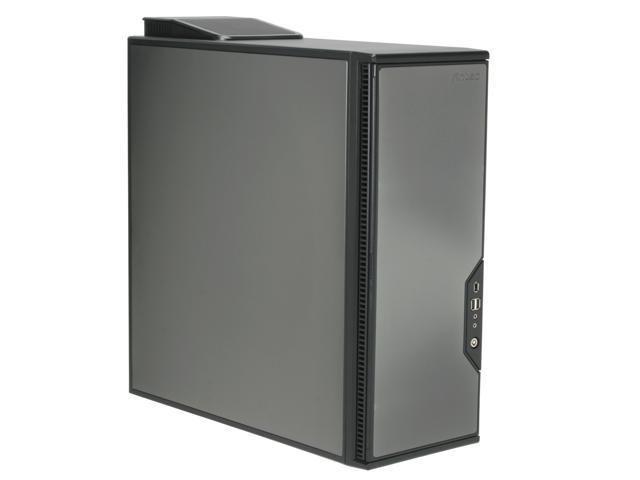
1b) Keep in mind your ultimate goal when selecting other parts of the computer. When looking at motherboards, try to find ones with completely passive cooling. Motherboard chipset fans can be extremely obnoxious as they emit a high pitch sound due to their small size and high rpm. When looking into CPUs try to find ones with lower power ratings. Newer generations of chips with smaller fab will generally run cooler at a said speed compared to older chips. If you purchase the correct items in the start you will have a much easier time in getting your computer to run quietly.
If you are silencing a pre-existing case, start here:
2) Fans: The first step, and one of the cheapest and most effective step of silencing your computer, is buying quieter fans. I found that using multiple low rpm fans often yields better, or quieter, results than a single high rpm/loud fan. Also keep in mind that the location of the fan matters. Because front intake fans are physically closer to you, you can hear them clearer than rear fans. Thus, I usually put higher (relatively speaking) powered fans in the back, and quieter fans in the front, side, or top. Finally, make sure you keep an eye on system temperature, as reduced noise often leads to reduced airflow and increased temperature.
Recommended fans:
- Noctua NF-P12 120mm fan *
- Noctua NF-S12 120mm fan
- Nexus Real Quiet 80mm fan
- Scythe Minebea NMB Silent 80mm fan
- Arctic Cooling 120mm PWM Fan**
*This fan is designed to be used with heatsinks as they produce more static pressure than Noctua NF-S12 series fans.
**This fans are great if your system produces a lot of heat, as they will speed up and move more air as your CPU temperature increases.

4) Fan Accessories: Besides buying quieter fans, you can also pick up rubber screws and fan dampeners. These are not as affective as getting new fans, but they do help a bit. You will notice the biggest difference if you are using a cheap case, as they reduce the vibrations your fans pass off to your case. In normal cases, your fan should sound a bit "smoother" than before, but the whooshing sound won't stop. They are also pretty cheap. Finally, you can buy a fan controller to undervolt your fan.
Recommended fan accessories:
- Vantec 120mm Fan Dampeners *
- Vantec 80mm Fan Dampeners *
- Acouti Silicon Polymer fan mounts
- Zalman Fan Mate 2
- Sunbeam RHK-BA Rheobus Fan Controller
*comes in packs of 2
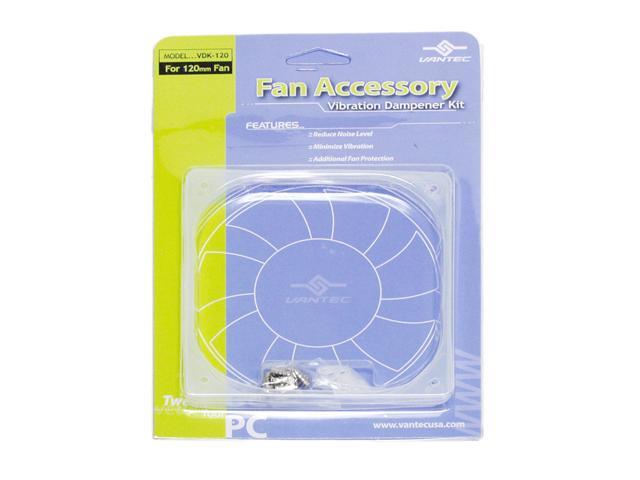
4) CPU Cooler: Stock CPU coolers are generally very loud; this is mainly due to their low profiles and small/high rpm fans. CPU heat-sinks can make a big difference in sound, but are also relatively more expensive. It is also more difficult to install. Because of the size and weight of many aftermarket coolers, they often require a back plate, which requires you to dismount your motherboard. Generally look for heatsinks with large and low rpm fans. Noctua, Zalman, Thermaltake, Zerotherm, Scythe and Tuniq all make nice aftermarket heatsinks. If you do not wish to replace your entire heatsink, you can try zip tie-ing larger and quieter fans to your existing heatsink. However, this can be messy and might not work well. Remember, most "high performance" coolers comes with high rpm fans. Just because it's a 120mm fan does not mean that it is quiet. Noctua and Scythe make some of the best quiet heatsinks available. Also remember that heatsinks with tight fin spacing will be louder as their will be more friction generated by the air passing through.
Recommended CPU Cooler:
- Arctic Cooling Freezer 7 Pro *
- Tuniq Tower 120
- Zalman CNPS9900
- Zalman CNPS9700
- Noctua NH-U12P SE2
- Xigmatek Dark Knight**
*This is generally regarded as the "best bang for the buck" heatsink available. It might not be extremely quiet but it's definitely an improvement over stock heatsinks.
**This is a great heatsink but the fan isn't the best. Replace the fan with any a Noctua NF-P12 would produce better results.
Passive CPU Cooler: These heatsinks can be used without fans in well ventilated cases. They are the pinnacle of silence.
- Scythe Ninja Rev. B
- Thermalright Ultra-120 eXtreme
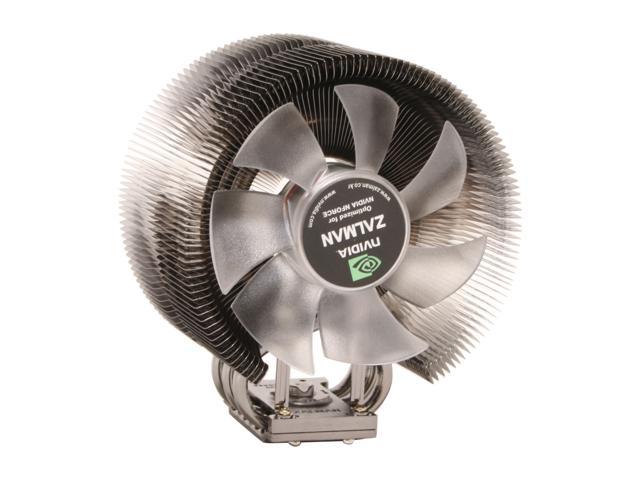
5) GPU Cooler: Next comes the GPU cooler. GPU coolers usually use smaller fans than CPU coolers and thus have higher rpm fans. Stock GPU heatsink fans are usually incredibly loud and thus have to be replaced if you are really into silence. There are a few fan-less coolers out there for low to medium powered cards. However, any high end gaming card will require a heatsink with a fan. Aftermarket cooler such as the Zalman VF900 and VF1000 are usually suffice for most people not overclocking. Also keep in mind that aftermarket GPU coolers almost always take up more than 1 PCI slot, some may even take 2 more. Make sure you have enough space in your case to accommodate your new heatsink. When changing heatsinks, remember that the voltage regulators and the memory chips also need cooling. Finally, remember that changing the heatsink usually WILL void all warranties on video cards.
Recommended GPU Cooler:
- Scythe SCVMS-1000
- Arctic Cooling AccelS1 Rev 2
- Zalman VF900-CU
- Zalman ZM80D-HP Fanless VGA Cooler
- Thermalright T-Rad2
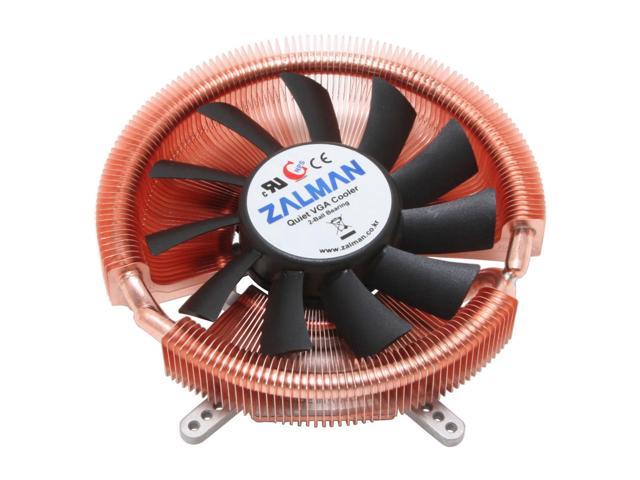
6) Chipset Heatsinks: The northbridge (or southbridge) heatsinks usually performs fine and does not need to be changed. However, for those with non-passive chipset coolers with loud and high rpm fans, changing it might be a must to ensure quiet operations. Compatibility, however, is a pain to deal with as there isn't as much of a standard for these heatsinks as CPU and GPU heatsinks. Some heatsinks will also require you do remove your motherboard from the case. Furthermore, before installing a large northbridge cooler, be sure that the heatsink will not interfere with other components, mainly expansion cards.
Recommended North Bridge Heatsinks
- Thermalright HR-05
- Thermalright HR-05-SLI
- Zalman ZM - NBF 47
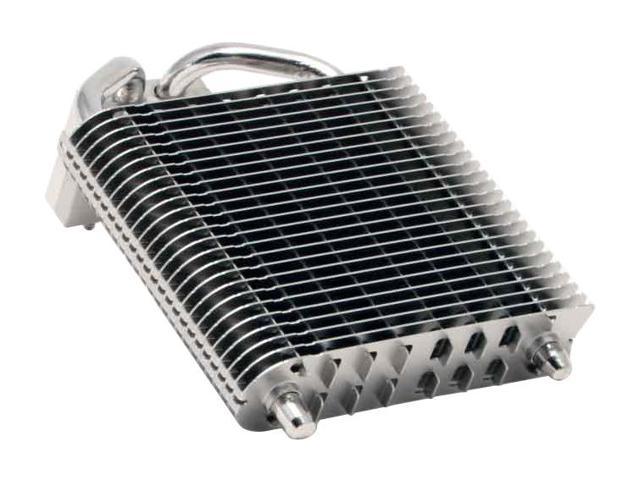
7) Hard Drives: Hard drives will usually start to become annoying after you silence the rest of the computer. Silencing a hard drive is pretty simple. There are many hard drive vibration dampeners and enclosures that will both silence and cool your hard drive. Silencers range greatly in price, anywhere from cheap rubber screws to complete aluminum enclosures. I own the Scyth HDD Stabilizer 2, which is one of the cheaper dampeners. It does NOT completely silence the hard drive. Instead, the hard drive now produces a deep rumble sound instead of the high pitched clicks. These devices will also require you to move your hard drive to a 5.25" bay.
You can also try the elastics mod for your hard drive, where you suspend your hard drive between elastics, which should also reduce vibrations. It should look something like this:

Finally you can purchase a SSD if you want a truly silent hard drive. They are, however, very expensive.
Recommended HDD silencers:
- Scyth Anti-Vibration HDD Stabilizer 2
- Nexus DiskTwin Hard Drive noise Dampener
- Nexus Drive-A-Way HDD Silencer

8) Power Supply: The power supply is a tricky thing to tune for silence, and should be one of the last things you need to worry about as long as you have a quality unit, as you generally do not want to open it up and change the fan. That said, you can look for high efficiency power supplies (80+ ones), as they will produce less heat. More over, do not buy power supplies with multiple fans, as they are usually loud. You can also try a power supply rubber dampener, but they generally do not do much. Finally, if you are REALLY into silence, you can buy a passively cooled power supply. These, however, cost a premium and are hard to find in higher wattages. Note, 120mm in power supplies does not always mean quieter units. Because of the orientation of the fan, a lot of turbulence is created within the power supply which generates noise. High quality units with 80mm fans, mainly PC Power & Cooling Silencers, are also rather quiet.
Recommended Products:
- Power Supply rubber silencer
- FPS Group ZEN 400watt Fanless Powersupply
- Silverstone Nightjar 400watt Fanless Powersupply *
- http://www.newegg.com/Product/Product.aspx?Item=N82E16817151099
**A 450 watt version of this power supply is available in other places.
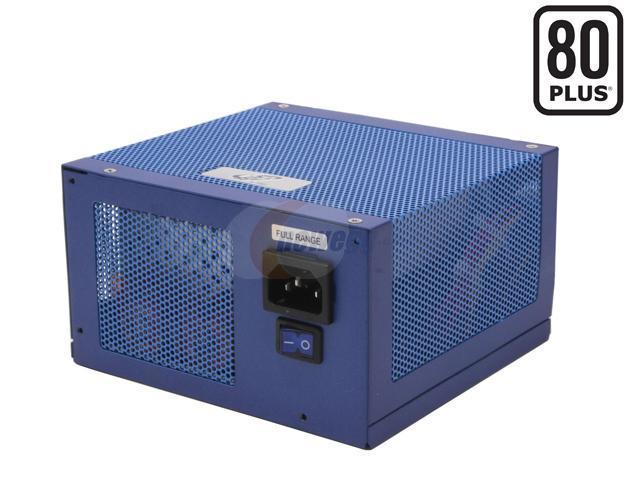
Things to do at your own risk:
There are a few things you can do at your own risk that can help quiet things down a bit.
1) Undervolting your CPU. By undervolting, your CPU will run cooler. It may, however, become unstable so do this at your own risk.
2) Swap power supply fans. Many power supplies (even name brand ones), come with obnoxious fans. You can swap out these fans with quieter ones (once again, at your own risk). You can either solder the wires together or, if you're lucky, you can plug your fan right into the power supply's own fan header inside the unit.
3) Cutting off the "punch out" fan vents on cheaper cases and replacing them with fan grills helps a lot in terms of reducing noise. You will need at least a nibbler and a plier to do this (it will be pretty time consuming), but power tools such as a dremal will help. This will allow more air flow and produce less noise due to the reduced turbulance. For front fans, you can usually just leave it open without a grill as the front panel of the case will protect the fan.
4) Lining the interior of your case with noise dampening material can potentially be affective if done correctly. See below for recommended dampening material. Keep in mind that this is one of the last things you should do to your case. It would not make a significant change in noise level unless you use expensive dampening material. Furthermore, the dampening material only blocks high pitched noise.
Other Recommended Products:
- 120mm Black Fan Grill
- Acousti Products Soundproofing Acoustic Material Kit
- Zalman Fan Mate 2
- Sunbeam RHK-S Rheobus Fan Controller
- Xoxide PC Vibration Dampening Kit

Final Thoughts:
Cable organizations is a must if you want your computer to be quiet. Any obstruction in your case will reduce the overall airflow and increase the temperature inside the case; with slow fans, you cannot afford any less airflow than you already have. Use zip ties to tie cables together. Next you can also buy a passive north bridge cooler if your north bridge heatsink has a fan on it. However make sure that it is compatible with your motherboard and northbridge chip. Silencing your computer might be a daunting task but it's very rewarding at the end. There are many other guides online and even forums dedicated to quiet computing. Said websites include:
http://www.silentpcreview.com/
http://www.acousticpc.com/
http://www.quietpcusa.com/index.aspx
http://www.endpcnoise.com/cgi-bin/e/index.html
And if you're rich and don't feel like doing all this yourself, you can just pick up this case.
http://www.xoxide.com/zalman-tnn300.html

Updated as of 1/29/2011
Here's my attempt at a step-by-step guide to make any computer quiet. This guide will not include anything on watercooling as I have no experience in that field. Everything this guide talks about is related to air cooling.
If you are building a new computer, start here:
1a) A well designed computer case, or a case designed for quiet computing, such as the Antec P182 or Antec Sonata, can make this process a lot easier. Stay AWAY from the cheap and light cases, as they do not dampen sound at all. Also keep away from popular "gaming" cases with a lot of open ventilation (Coolermaster HAF, Antec 900/1200 etc), these vents will allow a direct escape path for noise. If you cannot afford an expensive case, do look for one that uses 120mm fans instead of 80mm fans, as a 120mm silent fan will move more air than an 80mm silent fan.
Recommended Cases:
Full Towers:
- Antec P182
ATX Mid Towers
- Antec Sonata
Micro-ATX Mid Towers
- Antec P180 Mini
- Antec NSK 3480
Micro-ATX Desktops
- Lan-Gears Da Box 100
Mini-ITX
- Antec ISK 300
- Silverstone SG06-B

1b) Keep in mind your ultimate goal when selecting other parts of the computer. When looking at motherboards, try to find ones with completely passive cooling. Motherboard chipset fans can be extremely obnoxious as they emit a high pitch sound due to their small size and high rpm. When looking into CPUs try to find ones with lower power ratings. Newer generations of chips with smaller fab will generally run cooler at a said speed compared to older chips. If you purchase the correct items in the start you will have a much easier time in getting your computer to run quietly.
If you are silencing a pre-existing case, start here:
2) Fans: The first step, and one of the cheapest and most effective step of silencing your computer, is buying quieter fans. I found that using multiple low rpm fans often yields better, or quieter, results than a single high rpm/loud fan. Also keep in mind that the location of the fan matters. Because front intake fans are physically closer to you, you can hear them clearer than rear fans. Thus, I usually put higher (relatively speaking) powered fans in the back, and quieter fans in the front, side, or top. Finally, make sure you keep an eye on system temperature, as reduced noise often leads to reduced airflow and increased temperature.
Recommended fans:
- Noctua NF-P12 120mm fan *
- Noctua NF-S12 120mm fan
- Nexus Real Quiet 80mm fan
- Scythe Minebea NMB Silent 80mm fan
- Arctic Cooling 120mm PWM Fan**
*This fan is designed to be used with heatsinks as they produce more static pressure than Noctua NF-S12 series fans.
**This fans are great if your system produces a lot of heat, as they will speed up and move more air as your CPU temperature increases.

4) Fan Accessories: Besides buying quieter fans, you can also pick up rubber screws and fan dampeners. These are not as affective as getting new fans, but they do help a bit. You will notice the biggest difference if you are using a cheap case, as they reduce the vibrations your fans pass off to your case. In normal cases, your fan should sound a bit "smoother" than before, but the whooshing sound won't stop. They are also pretty cheap. Finally, you can buy a fan controller to undervolt your fan.
Recommended fan accessories:
- Vantec 120mm Fan Dampeners *
- Vantec 80mm Fan Dampeners *
- Acouti Silicon Polymer fan mounts
- Zalman Fan Mate 2
- Sunbeam RHK-BA Rheobus Fan Controller
*comes in packs of 2
4) CPU Cooler: Stock CPU coolers are generally very loud; this is mainly due to their low profiles and small/high rpm fans. CPU heat-sinks can make a big difference in sound, but are also relatively more expensive. It is also more difficult to install. Because of the size and weight of many aftermarket coolers, they often require a back plate, which requires you to dismount your motherboard. Generally look for heatsinks with large and low rpm fans. Noctua, Zalman, Thermaltake, Zerotherm, Scythe and Tuniq all make nice aftermarket heatsinks. If you do not wish to replace your entire heatsink, you can try zip tie-ing larger and quieter fans to your existing heatsink. However, this can be messy and might not work well. Remember, most "high performance" coolers comes with high rpm fans. Just because it's a 120mm fan does not mean that it is quiet. Noctua and Scythe make some of the best quiet heatsinks available. Also remember that heatsinks with tight fin spacing will be louder as their will be more friction generated by the air passing through.
Recommended CPU Cooler:
- Arctic Cooling Freezer 7 Pro *
- Tuniq Tower 120
- Zalman CNPS9900
- Zalman CNPS9700
- Noctua NH-U12P SE2
- Xigmatek Dark Knight**
*This is generally regarded as the "best bang for the buck" heatsink available. It might not be extremely quiet but it's definitely an improvement over stock heatsinks.
**This is a great heatsink but the fan isn't the best. Replace the fan with any a Noctua NF-P12 would produce better results.
Passive CPU Cooler: These heatsinks can be used without fans in well ventilated cases. They are the pinnacle of silence.
- Scythe Ninja Rev. B
- Thermalright Ultra-120 eXtreme

5) GPU Cooler: Next comes the GPU cooler. GPU coolers usually use smaller fans than CPU coolers and thus have higher rpm fans. Stock GPU heatsink fans are usually incredibly loud and thus have to be replaced if you are really into silence. There are a few fan-less coolers out there for low to medium powered cards. However, any high end gaming card will require a heatsink with a fan. Aftermarket cooler such as the Zalman VF900 and VF1000 are usually suffice for most people not overclocking. Also keep in mind that aftermarket GPU coolers almost always take up more than 1 PCI slot, some may even take 2 more. Make sure you have enough space in your case to accommodate your new heatsink. When changing heatsinks, remember that the voltage regulators and the memory chips also need cooling. Finally, remember that changing the heatsink usually WILL void all warranties on video cards.
Recommended GPU Cooler:
- Scythe SCVMS-1000
- Arctic Cooling AccelS1 Rev 2
- Zalman VF900-CU
- Zalman ZM80D-HP Fanless VGA Cooler
- Thermalright T-Rad2

6) Chipset Heatsinks: The northbridge (or southbridge) heatsinks usually performs fine and does not need to be changed. However, for those with non-passive chipset coolers with loud and high rpm fans, changing it might be a must to ensure quiet operations. Compatibility, however, is a pain to deal with as there isn't as much of a standard for these heatsinks as CPU and GPU heatsinks. Some heatsinks will also require you do remove your motherboard from the case. Furthermore, before installing a large northbridge cooler, be sure that the heatsink will not interfere with other components, mainly expansion cards.
Recommended North Bridge Heatsinks
- Thermalright HR-05
- Thermalright HR-05-SLI
- Zalman ZM - NBF 47

7) Hard Drives: Hard drives will usually start to become annoying after you silence the rest of the computer. Silencing a hard drive is pretty simple. There are many hard drive vibration dampeners and enclosures that will both silence and cool your hard drive. Silencers range greatly in price, anywhere from cheap rubber screws to complete aluminum enclosures. I own the Scyth HDD Stabilizer 2, which is one of the cheaper dampeners. It does NOT completely silence the hard drive. Instead, the hard drive now produces a deep rumble sound instead of the high pitched clicks. These devices will also require you to move your hard drive to a 5.25" bay.
You can also try the elastics mod for your hard drive, where you suspend your hard drive between elastics, which should also reduce vibrations. It should look something like this:

Finally you can purchase a SSD if you want a truly silent hard drive. They are, however, very expensive.
Recommended HDD silencers:
- Scyth Anti-Vibration HDD Stabilizer 2
- Nexus DiskTwin Hard Drive noise Dampener
- Nexus Drive-A-Way HDD Silencer
8) Power Supply: The power supply is a tricky thing to tune for silence, and should be one of the last things you need to worry about as long as you have a quality unit, as you generally do not want to open it up and change the fan. That said, you can look for high efficiency power supplies (80+ ones), as they will produce less heat. More over, do not buy power supplies with multiple fans, as they are usually loud. You can also try a power supply rubber dampener, but they generally do not do much. Finally, if you are REALLY into silence, you can buy a passively cooled power supply. These, however, cost a premium and are hard to find in higher wattages. Note, 120mm in power supplies does not always mean quieter units. Because of the orientation of the fan, a lot of turbulence is created within the power supply which generates noise. High quality units with 80mm fans, mainly PC Power & Cooling Silencers, are also rather quiet.
Recommended Products:
- Power Supply rubber silencer
- FPS Group ZEN 400watt Fanless Powersupply
- Silverstone Nightjar 400watt Fanless Powersupply *
- http://www.newegg.com/Product/Product.aspx?Item=N82E16817151099
**A 450 watt version of this power supply is available in other places.

Things to do at your own risk:
There are a few things you can do at your own risk that can help quiet things down a bit.
1) Undervolting your CPU. By undervolting, your CPU will run cooler. It may, however, become unstable so do this at your own risk.
2) Swap power supply fans. Many power supplies (even name brand ones), come with obnoxious fans. You can swap out these fans with quieter ones (once again, at your own risk). You can either solder the wires together or, if you're lucky, you can plug your fan right into the power supply's own fan header inside the unit.
3) Cutting off the "punch out" fan vents on cheaper cases and replacing them with fan grills helps a lot in terms of reducing noise. You will need at least a nibbler and a plier to do this (it will be pretty time consuming), but power tools such as a dremal will help. This will allow more air flow and produce less noise due to the reduced turbulance. For front fans, you can usually just leave it open without a grill as the front panel of the case will protect the fan.
4) Lining the interior of your case with noise dampening material can potentially be affective if done correctly. See below for recommended dampening material. Keep in mind that this is one of the last things you should do to your case. It would not make a significant change in noise level unless you use expensive dampening material. Furthermore, the dampening material only blocks high pitched noise.
Other Recommended Products:
- 120mm Black Fan Grill
- Acousti Products Soundproofing Acoustic Material Kit
- Zalman Fan Mate 2
- Sunbeam RHK-S Rheobus Fan Controller
- Xoxide PC Vibration Dampening Kit

Final Thoughts:
Cable organizations is a must if you want your computer to be quiet. Any obstruction in your case will reduce the overall airflow and increase the temperature inside the case; with slow fans, you cannot afford any less airflow than you already have. Use zip ties to tie cables together. Next you can also buy a passive north bridge cooler if your north bridge heatsink has a fan on it. However make sure that it is compatible with your motherboard and northbridge chip. Silencing your computer might be a daunting task but it's very rewarding at the end. There are many other guides online and even forums dedicated to quiet computing. Said websites include:
http://www.silentpcreview.com/
http://www.acousticpc.com/
http://www.quietpcusa.com/index.aspx
http://www.endpcnoise.com/cgi-bin/e/index.html
And if you're rich and don't feel like doing all this yourself, you can just pick up this case.
http://www.xoxide.com/zalman-tnn300.html
Updated as of 1/29/2011
Last edited:
